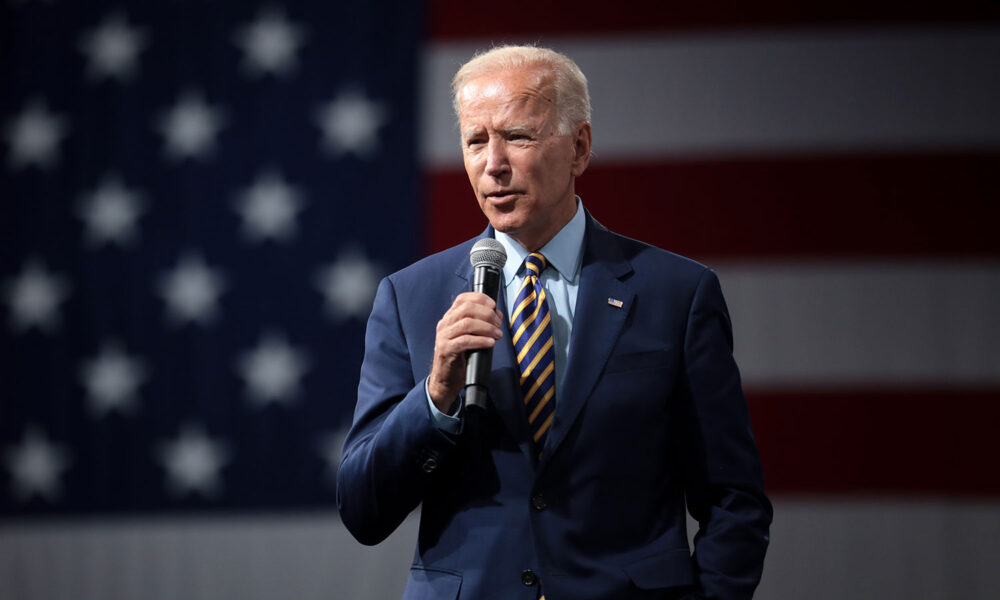As President-elect Biden prepares for the enormous responsibility of becoming president of the United States, there is one question I want to ask him: Sir, are you a fan of a nuclear arms race? Because you are being handed one, a burgeoning nuclear and technology arms race waged by Russia, China, and the United States.
The Trump administration has embraced this race, with the president’s chief arms control negotiator declaring that the United States knows “how to win these races and we know how to spend the adversary into oblivion.” (Oblivion? Seriously?) And yet, perhaps surprisingly, it was President Barack Obama who started the wheels churning on all this; his administration lay plans to build new versions of every piece of the oversized US nuclear force structure—new long-range bombers, new land-based missiles, new nuclear-armed submarines, new nuclear-armed cruise missiles, and new versions of the nuclear warheads they carry. Since coming to office, President Trump added to the list a new, lower-yield nuclear warhead, a new submarine-launched cruise missile, and one more new nuclear warhead for submarine-based missiles.
How President Biden can reduce the risk of nuclear war
President Biden should use his first hundred days to re-evaluate US nuclear weapons policy. Indeed, he should rethink the entire US approach to “national security” by looking at the real threats we face—threats like climate change, pandemics, cyberwarfare, and election interference—and measure them against the $740 billion annual defense budget and the planned $1.2 trillion of spending on new nuclear weapons over the next 30 years. Those huge numbers are simply not justifiable when they don’t make the people of the United States more secure. President Biden has the opportunity to shift money to address more important threats, reduce the importance of nuclear weapons, and short-circuit the new arms race.
We will get one indication of the new president’s approach to this when he submits his first budget request, likely sometime in March. Will he use that opportunity to cancel the new land-based nuclear-armed missile, which has a lifetime estimated cost of $264 billion? He should. UCS has explained very clearly why land-based missiles are not only superfluous to US security but, because they are kept on high alert, they also increase the likelihood of accidental—and catastrophic—nuclear war.
As a centrist, however, President Biden might not jump to make such a significant shift in US security policy, even though it is well past time for such a change. His more likely choice would be to delay the new land-based missile and extend the life of the current fleet, something the Congressional Budget Office estimates would save $37 billion over the next 15 years.
If he does indeed retain land-based missiles for now, Biden should take steps to reduce the risk created by the current alert posture and declaratory policy. At present, the United States reserves the right to use nuclear weapons first in a conflict, gives the president the sole authority to launch a nuclear attack, and keeps US missiles ready to fire within minutes of a launch order from the president. Intended to deter a nuclear attack on the United States, these policies instead make nuclear war more likely because of the too real possibility of a mistaken or accidental launch. Indeed, history is replete with close calls where the United States or Russia nearly launched nuclear weapons in error.
The good news is that President-elect Biden is already on record supporting a No First Use nuclear policy, a declaration that the United States would never use nuclear weapons first. The 2020 Democratic Party Platform endorses a similar policy, declaring that the “sole purpose of our nuclear arsenal should be to deter—and, if necessary, retaliate against—a nuclear attack.” In either case, it should be clear that the United States will never, ever start a nuclear war.
Adopting either policy will require working closely with US allies, to ensure that they understand that declaring “No First Use” or “sole purpose” would not weaken US commitment to their security. Completing those consultations will likely take longer than 100 days, but the Biden team should quickly get that ball rolling.
President Biden should also prioritize ending the president’s unlimited authority to start a nuclear war. The inherent danger of this policy was recently highlighted again when President Trump contracted the novel coronavirus and was reportedly given a cocktail of drug treatments, including steroids, which have the potential to affect an individual’s behavior and decision-making abilities. Indeed, the New York Times wondered “whether a president taking mood-altering drugs could determine whether a nuclear alert was a false alarm.”
To solve this problem, UCS has proposed requiring that the vice president and the Speaker of the House be included in the decision-loop—a policy that Biden should implement as soon as he comes to office. Adding them to the decision process would greatly reduce the chance that one person—the president—could start a needless nuclear war, while not significantly increasing the time such a decision would take.
Making the world safer through international arms control
Shortly after he enters office on January 20, President Biden will have another golden opportunity to make the world safer: extending the New START arms control agreement with Russia, which will expire on February 5 unless the two countries agree to extend it for a period of up to five years. The treaty, which verifiably limits each country to no more than 1,550 deployed long-range nuclear weapons, is the last remaining bilateral arms control agreement between the two countries that together have more than 90 percent of the world’s nuclear weapons.
Extending New START is a no-brainer and, because Russia agrees, it should happen quickly. The challenge is, what comes next? Making real progress will require a fundamental reassessment of the US approach to arms control. In particular, it will require touching what has become, since 9/11, a third rail of US politics—allowing limits on long-range missile defenses. Such limits will likely be the only way to interest Russia in a treaty and a required step to getting China to join such discussions. Unfortunately, despite accumulating evidence that long-range missile defenses are expensive, ineffective, and create incentives for adversaries to improve their nuclear arsenals, the program retains bipartisan support. It will take some doing for President Biden to move this forward but he can start with the science, which shows that these missile defenses do not work.
Two days after his inauguration, President Biden will have another opportunity to make forward-looking nuclear policy changes. That day, the Treaty on the Prohibition of Nuclear Weapons, a.k.a. the ban treaty, will enter into force, having been ratified by 50 countries. Both the Obama and Trump administrations actively opposed the treaty, but Biden should address the concern it reflects, that the United States is doing too little to live up to its commitments to nuclear disarmament.
There is one final area where President-elect Biden should move quickly. He should extend and expand the limited benefits that are provided to those who have been and continue to be harmed by US nuclear weapons activities. Current US law—the Radiation Exposure Compensation Act—provides limited benefits to some of these affected communities, but it expires in 2022. Biden should push Congress to pass legislation to extend the program and expand it to include more of those adversely impacted by the US nuclear weapons program.
Aside from the likely extension of New START, none of this will come easily. And President Biden is not someone who will be naturally inclined to push for major changes in US nuclear policy, even if they would make us safer. Too much campaign money is linked to defense contractors, and too many Democrats are afraid to appear weak on defense. At the same time, because so much is at stake with the pandemic and climate change, the new president will have the opportunity to undertake the necessary “rethink” and Biden should seize that opportunity.
Moreover, simply because he is not Donald Trump, President Biden will have the chance to chart a significantly new course, to put forth a new vision that makes a more realistic assessment of US priorities, one that chooses human needs over military excess. The country, tired of Trump’s self-centered vision and incoherent approach to any issue, will be inclined to support any well-considered policy that is ably advanced and makes the country safer.
But to make that happen, we will need to push the president to take that bold path. UCS, with its combinations of scientist experts, experienced organizers, and advocates in Washington like me, is positioned to make that push. We have a plan in place, we have the policies Biden should pursue. But we will need your help, to make it clear to the Biden administration that not only do we expect much of him, but that we will have his back if he delivers.
Let’s do this!
The featured image in this blog is courtesy of Gage Skidmore on Flickr (CC BY-SA 2.0)

